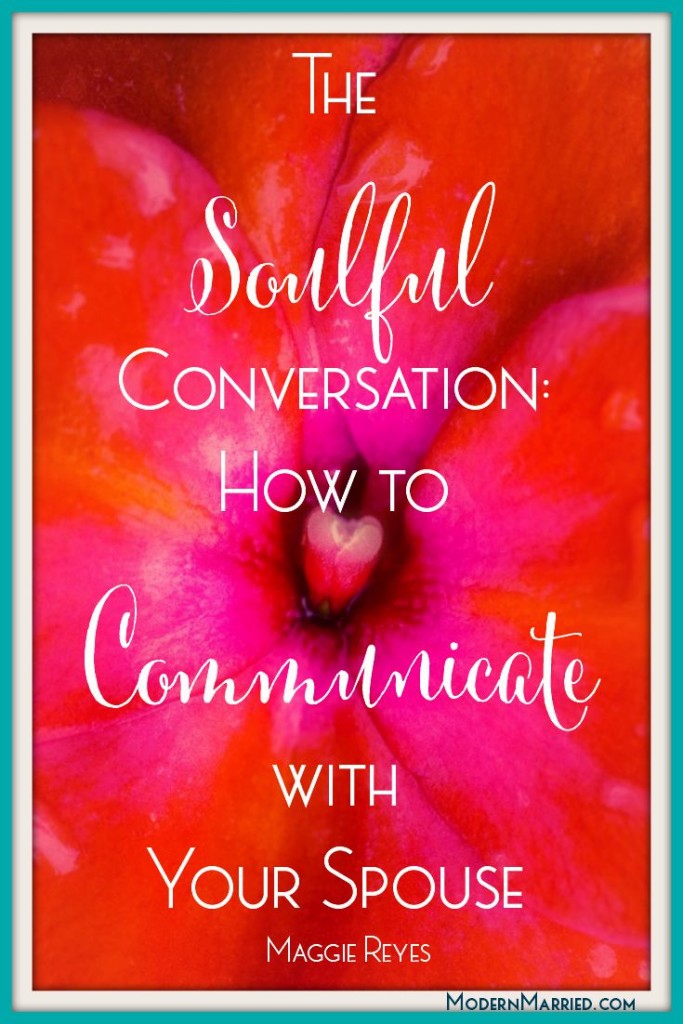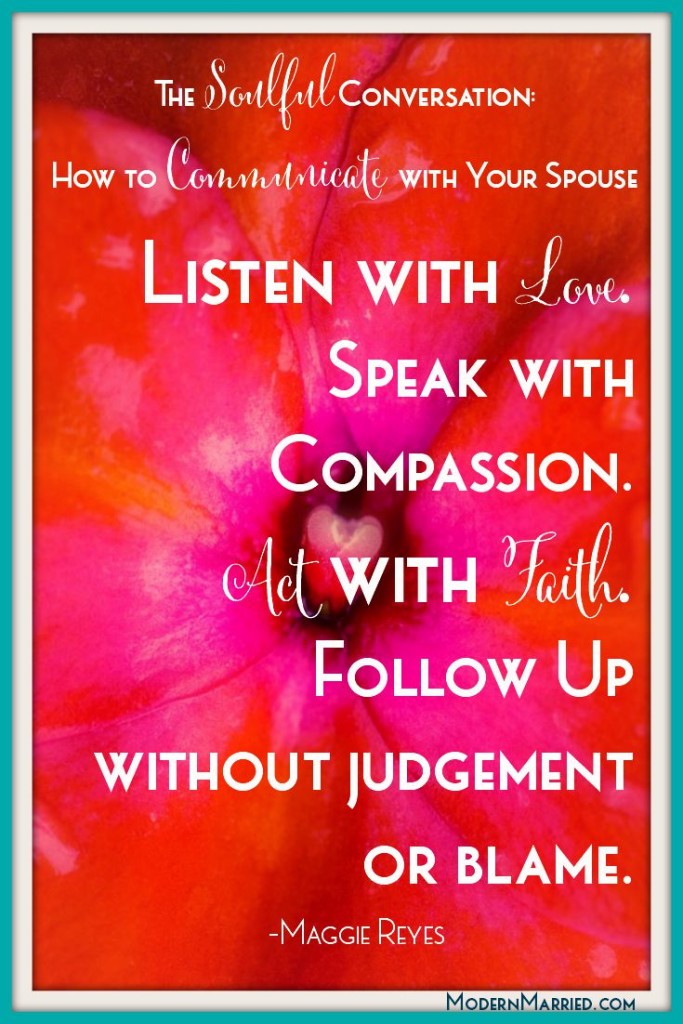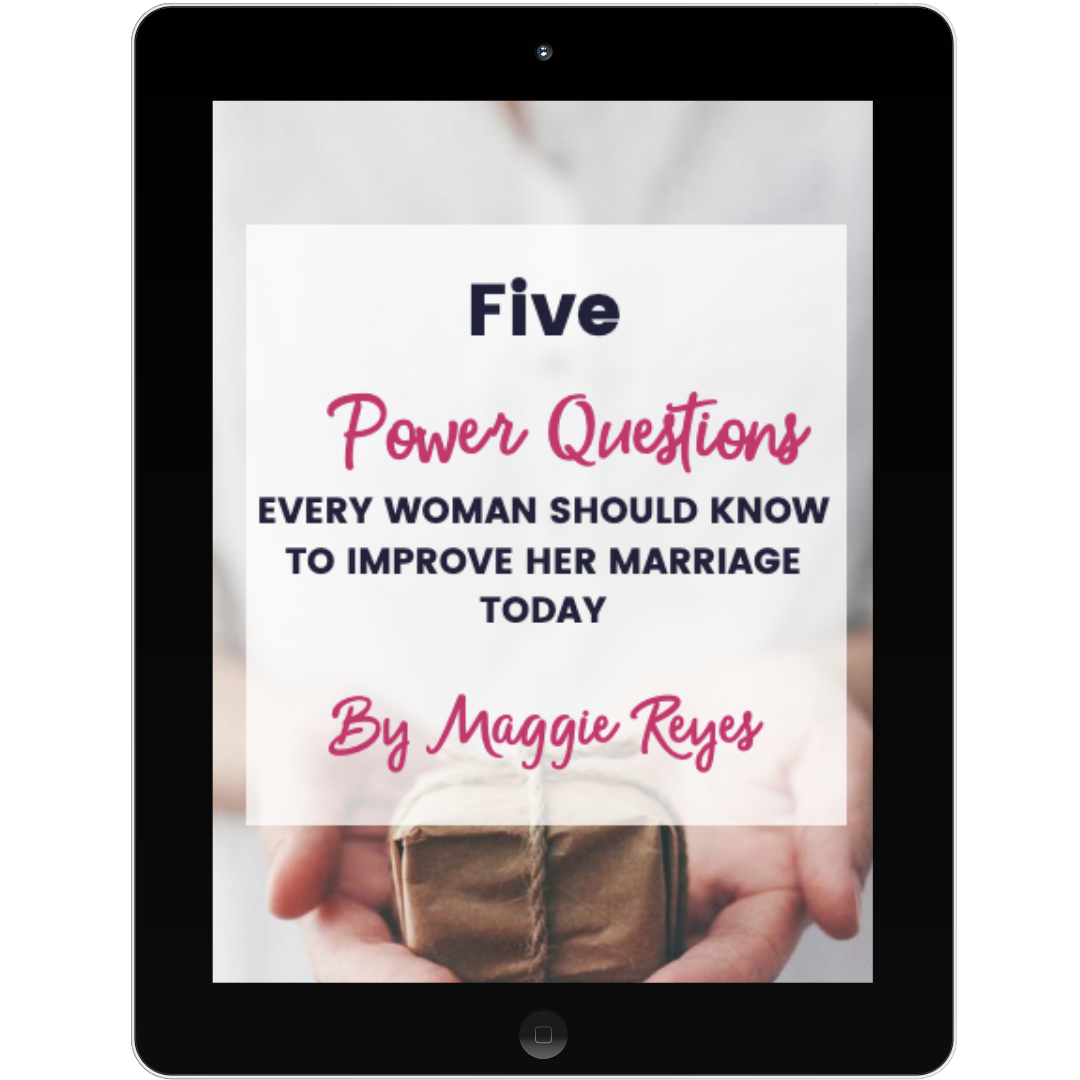A couple of weeks ago I got asked to participate in an expert series and the interviewer wanted to know what I wanted to talk about.
I told her my topic would be conversations.
I want to have a conversation about conversations.
Yes I do.
I called my talk How to Have a Soulful Conversation, but it’s really about how to communicate with your spouse, or anyone, in an intentional, loving way.
Before I tell you the 4 main elements of a soulful conversation, I want us to think about conversations for a minute.
I am slightly obsessed with conversations.
When you stop and think about it, ALL of our life happens inside a conversation.
It’s either a conversation with someone else, or the conversation inside our heads.
I don’t know about you, but my head can be quite the Chatty Cathy.
Anyway, no matter what is happening around us, it’s happening inside a conversation.
And yet, there is no Conversation 101 in kindergarten. Or college.
Conversations are how we take jobs, leave bosses, get engaged, start a business, plan a vacation, choose where to go for lunch on a Saturday, rent an apartment, and buy a house. You get the idea.
Yes written documents come later for the big stuff, but it all starts with the talking and the listening.
So I think it’s about time we all get just a little bit better at having them.
According to Google, the definition of a conversation is “the informal exchange of ideas by spoken words.”
Stop for a minute and think about the last conversation you had. Is your first thought about the “talking” or the “listening.”?
I usually think about the talking part first and yet most of the time, the most important thing we do in conversations is listen. Hopefully with focused attention and whenever possible with love.
That’s the first ingredient of a soulful conversation, to listen with love.
Yes, even at PTA meetings or budget reviews or to the little league umpire.
Especially at little league.
How we listen colors the entire conversation. The lens we are listening through matters.
Let’s say your hubby says, “let’s go to dinner.” And you listen with the “I am so tired” lens. The “why is he suggesting this? Doesn’t he know the day I have had?” (and no, he doesn’t if you haven’t told him, which is why daily check in conversations are so important).
How about this lens, “That’s so sweet of him to suggest. He really wants to try to spend quality time together.”
The only thing that changed in that scenario is the lens through which we were listening.
I invite you today to challenge yourself to listen with love as often as possible.
Even when you are talking about groceries.
You can build your love-listening muscle by listening with love during the little day to day conversations where it’s super easy to tune into that feeling with almost no resistance.
Then, when you are in a more challenging situation, your love-listening muscle will be strong and ready.
How do you do this if it doesn’t come naturally? Practice of course. And focusing on assuming the best instead of whatever is going through your mind that doesn’t feel good.
For us to feel good and to help others feel good, we need to practice cultivating mindsets that feel better.
That does not mean every day will be the pinnacle of awesome. But it does mean that a bad day can be better, with a slight change in the lens through which you listen.
The second element of a soulful conversation is of course, how we speak.
First, listen with love.
Then, speak with compassion.
According to Merriam-Webster, the definition of compassion is “sympathetic consciousness of others distress with a desire to alleviate it”
According to me, that translates to, “tuning in to another person’s experience with a desire to make it better”
Listen with love.
Speak with compassion.
Sometimes we don’t know how to do this. That’s okay, we can just set the intention to be positive, nurturing, supportive and let whatever comes out of our mouths come.
If we set no intention, it’s like getting in the car and wanting to go a place you have never been without a map. We end up going around in circles. Getting frustrated and lost.
If we speak without compassion or the intention for it – we can speak with judgement, blame, criticism and anger.
Think about this at work or at home, when this has happened to you. When someone spoke and obviously had one of those elements directed at you.
Not fun. Not constructive. And ultimately not useful.
This of course begs the question, can we listen with love when someone is speaking outside of compassion?
Of course.
That’s the most important time to do so. To listen to their pain, anger, frustration, and realize that person is suffering in some way and we can either respond to that suffering with love or we can amplify what they are feeling by responding with more of the same.
This can be so challenging sometimes, and we all fail at it sometimes. But it’s so important to keep building that love-listening muscle.
Because when you are able to listen with love and speak with compassion, even when it’s difficult, you open the door to the biggest breakthrough in your relationship with your spouse or with anyone including yourself.
If you mentally beat yourself up when you make a mistake, I am talking to you, with compassion of course, and telling you to stop that.
The first conversation we have is with ourselves and that’s the first one we can master because we control both the listening part and the talking part.
I am not saying it’s easy. I am saying it’s possible and worthwhile.
The last two elements of a soulful conversation happen after the conversation in the fluidity of life where we are constantly stepping into and out of conversations with our spouses and ourselves.
These elements are –
Act with Faith
Follow up without judgement or blame
Acting with faith is not about faith in the religious sense, but faith in the sense of “confidence or trust in a person or thing.”
Whatever the results of the conversation are, act with faith. Take the next step with confidence and trust.
Why is this important? Because doubt kills everything. Deals, Marriages, Friendships. Doubt can be a great warning signal to have a different conversation, or a deeper one, or to get more information to better understand.
So doubt is something to use to spur you into further investigation, but not useful when you have actually made an agreement and action is necessary.
At that point, whether it’s going to the grocery store, picking up socks or buying ticket to Italy, the most useful thing you can do is act with confidence and trust.
If doubt appears – initiate another conversation until your doubts can be answered, addressed and satisfied.
The end of the communication cycle is really a new beginning. Follow up without judgement or blame – means having a new conversation with love and compassion about whatever needs to be done, completed, eliminated, closed or addressed.
Learning how to communicate with your spouse takes time and practice and courage.
To try new things. To experiment with things that may feel uncomfortable and to be vulnerable in expressing both love and compassion.
However, if you can incorporate these 4 elements into your conversations with your spouse and with anyone you love, including yourself, you will quickly experience more peace, more productive conversations and a greater overall feeling of life satisfaction.
Don’t believe me. Try it.
This week’s LOVE WORK is to practice on yourself first, with the conversations inside your head. Listen with love and speak with compassion to yourself. Then act with faith and follow up with yourself without judgement or blame.
Are you struggling with your conversations?
Have you been having bad, or challenging conversations for a long time?
Do you need an extra dose of loving compassion to help you practice?
If so, personalized, one on one coaching might be a useful solution for you.
If you want some help communicating with yourself or with your spouse in a more loving compassionate way, click here to contact me to reserve an appointment time for free Relationship Breakthrough Conversation to help you move forward and explore if one of my personalized coaching programs might help you communicate more effectively.
If you know someone who is struggling with how to communicate, please send them this post. It might be the spark of inspiration they need to communicate more clearly, lovingly and heal their relationships.



